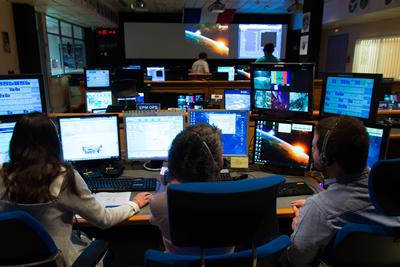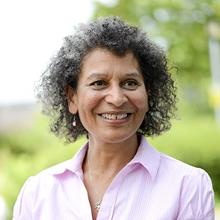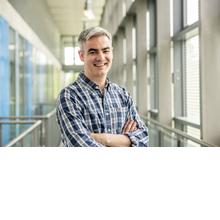Southampton project monitors astronauts’ muscle health

Scientists at the University of Southampton carrying out the first study of the effect of space flight on human muscle tone have reached a major milestone, as the team linked up with the International Space Station (ISS) for the first time.
The European Space Agency (ESA) project, titled the Myotones Project, aims to document the changes that occur in astronauts' muscles during their six-month stay on the ISS.
Professor Maria Stokes and Dr Martin Warner, from the University, were awarded £191,892 by the UK Space Agency (UKSA) for their team’s part in an international project led by Professor Dieter Blottner at the Charité University in Berlin, Germany. The funding from the UKSA and Science and Technology Facilities Council (STFC) has enabled a Research Fellow, Paul Muckelt, to join Professor Stokes and Dr Warner.
The loss of skeletal muscle mass and strength is a well-known side-effect of space travel, despite intensive daily exercise, but the ability to test muscles during an actual mission had until now been limited by lack of appropriate equipment. The Myotones Project uses recently developed, compact, technology that enables direct non-invasive testing of muscles in a confined and weightless (termed microgravity) environment.
The project team have now had their first live video link with the astronauts on the ISS from the Toulouse Space Centre, France, where they held a data collection session and guided the astronauts in performing measurements on their muscles over the next six months.
Dr Warner said: “During the live link we communicate with the astronauts to give instructions and guidance on how to collect the data. On the ground we have remote access to the equipment being used by the astronauts, enabling us to change settings and record data in real time. This ensures we collect accurate and reliable data that can be compared with the data collected on Earth before the astronauts leave for their ISS mission.”
Professor Stokes added: “This novel project that involves in-flight measurements provides a unique opportunity to monitor astronauts and learn more about the changes that happen to their muscles during and after spaceflight.”
The device, called the MyotonPRO, offers a hand-held, user-friendly method for rapid measurement of key biomechanical parameters, such as tone and stiffness of muscles and tendons.
The Southampton team are leading on the imaging aspect of the study where ultrasound scans are used to measure soft tissue thickness to help understand the changes in Myoton recordings. The ultrasound images are also being used to document changes in muscle size during the mission.
The project findings will not only help astronauts on future space missions deal with the loss of muscle, but will also benefit people on Earth by feeding back into research around muscle-wasting conditions.
Understanding more about what happens to muscles in weightlessness will give insights to help find the most effective ways of reducing and reversing the effects of disuse in astronauts or pathology in patients. The lessons learnt will help develop effective exercise programmes for people on Earth living with musculoskeletal and neurological disorders, as well as help reduce the effects of ageing.
Science Minister Sam Gyimah said: "This pioneering space project will assist us in tackling muscle-wasting conditions on Earth and reduce the effects of ageing, helping older citizens lead independent, fulfilling lives.
"It's a great example of how we are backing science and the space sector through our modern Industrial Strategy and how, through our Ageing Society Grand Challenge, we are harnessing the power of innovation to help meet the needs of an ageing society."
Libby Jackson, Human Spaceflight and Microgravity Programmer Manager at UKSA, said: “The International Space Station provides a unique laboratory that allows scientists to study a range of subjects, including how the human body ages, which can lead to benefits here on Earth.
“The UK Space Agency supports ground breaking experiments, like this one at the University of Southampton, to monitor the muscle health of astronauts on long-duration missions, as part of our commitment to ensure Britain is a leader in space-based scientific research and innovation.”
Four physiotherapy students, Jonathan Bridgeman, Richard Hargrave, Charlotte Martinelli, and Kathleen Tollerfield, who recently graduated from the University contributed to the Myotones project by testing technical aspects of the testing protocol as part of their degrees, supervised by Simon Brown and Professor Stokes. Jonathan said: “Having been involved in the last two years of my degree as part of my dissertation, it was really exciting to work as part of such a unique project.
“We hope that our research for the astronauts’ project will provide data to inform medical studies of patients on earth, ensuring the tests carried out in space remain relevant to clinical research developments.
“Working with the Myotones project team has proven to be a rewarding opportunity to learn how research at undergraduate level can feed into cutting-edge research in real life scenarios."


